MOVIES
England, 2012, 24 min
Chloe Symonds
25.01.2013 22:40
 What´sa nice Girl Like YOu doing in place like this? At a time when strippers are alternately viewed as victims of a patriarchal society or as ampowered feminist icons, this film follows two exotic dancers as they reflect upon their experiences of the industry, and contemplate how their job has affected their identities, touchign upon issues of gender, they body, and self hood.
What´sa nice Girl Like YOu doing in place like this? At a time when strippers are alternately viewed as victims of a patriarchal society or as ampowered feminist icons, this film follows two exotic dancers as they reflect upon their experiences of the industry, and contemplate how their job has affected their identities, touchign upon issues of gender, they body, and self hood.
Chloe Symonds having studied Social Anthropology as an undergraduate. She received the Arts and Humanities Research Council Scholarship to undertake a Master´s degree studying Visual Anthropology at Manchester University´s Granada centre.
Director: Chloe Symons
Production: Granada Centre for Visual Anthropology
Language of dialogues: English
Language of subtitles:-
Japan, 2011, 30 min
Ito Satoru
26.01.2013 20:20
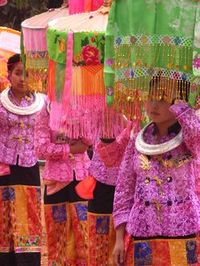 This film focuses how people share a collective sense of history through the auditory experience. dehong Tai people embrace Theravada Budhism. In ordes to live better in this world and the next, they perform dignified rituals and acquire "merit". For the rituals they spend years and save money, then they do a good deed like contribution of Budhist statues and building the bridges. chief donators commission an intellectual to write historical scriptures to hand down the good deed to posterity. It is called "Lik Yaat" in Tai and written with beautiful words and rhyme. After the cultural revolution, only a few intellectuals can create and chant "Lik Yaat" now. There is a woman, Wan Xiand-ya, who strives for the tradition of "Lik Yaat". She should be their first and last female intellectual who can write "Lik Yaat" in Tai history.
This film focuses how people share a collective sense of history through the auditory experience. dehong Tai people embrace Theravada Budhism. In ordes to live better in this world and the next, they perform dignified rituals and acquire "merit". For the rituals they spend years and save money, then they do a good deed like contribution of Budhist statues and building the bridges. chief donators commission an intellectual to write historical scriptures to hand down the good deed to posterity. It is called "Lik Yaat" in Tai and written with beautiful words and rhyme. After the cultural revolution, only a few intellectuals can create and chant "Lik Yaat" now. There is a woman, Wan Xiand-ya, who strives for the tradition of "Lik Yaat". She should be their first and last female intellectual who can write "Lik Yaat" in Tai history.
Ito Satotu studied Cultural Anthropology and Ethnomusicology in The Graduate University for Advanced Studies. now he id a Ph.D candidate and Visiting Researcher of National Museum of Ethnology, Osaka. He had done his 3 year fieldwork at tai village in Dehong prefecture, Yunnan Province, China. This film his first Anthropological film.
Director: Ito Satoru
Language of dialogues: Thai language in Dehong area, Yunnan Province, China
Language of subtitles: English, Czech
Launching of film,awards:
The Best Film, debut Competition, 6th Moscow International International Festival of Visual Anthropology (8-12 October 2012, Moscow, Russia)
12th RAI International Festival of Etnographic Film (23-26 june 2011, London, England)
9th WorldFilm - Tartu festival of visual culure (19-25 March 2012, Tartu Estonia)
UK, 2012, 45 min
Johannes Sjoberg
27.01.2013 13:00
Film reflection of the possibilities of using ethnofiction as an anthropological method during research of Brazilian transgendered communities in Sau Paulo.
World Premiere!
Peru, 2012, 15 min
Roger Villarroya
26.01.2013 18:10
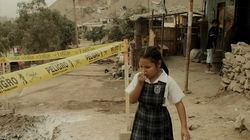 Social document from slum in peruan main city Lima. Every day the people fight for their lifes here , they want to survive and improve their living conditions. Their statements proves, that these people have same dreams and aims like anybody of us.
Social document from slum in peruan main city Lima. Every day the people fight for their lifes here , they want to survive and improve their living conditions. Their statements proves, that these people have same dreams and aims like anybody of us.
Director: Roger Villarroya
Production: Roger Villarroya
Language of dialogues: Spain
Language of subtitles: English, Czech
Denmark, 2012, 5 min
Peter I. Crawford
25.01.2013 19:35
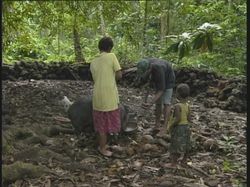 In some of the diverse cultures of the pacific, especially in Melanesia, the pig is the most important domesticated animal. It is predominantly used for ceremonial purposes such as in funerals, weddings and age-set rituals. Several of the films in the long-term Reef islands Ethnographic Film project thus show the killing of pigs in conjunction with such events, at times giving a some what disturbing impression of human-animal relationships, particularly for audiences uses to see meat only wrapped in cellophane at the local supermarket. In this short film a mummy, daddy, and their little son go out to feed their pigs, conveying the impression of an altogether different human-animal relationship, one of tenderness, care, and love, whilst also showing how children learn through awareness of animals nature and technology.
In some of the diverse cultures of the pacific, especially in Melanesia, the pig is the most important domesticated animal. It is predominantly used for ceremonial purposes such as in funerals, weddings and age-set rituals. Several of the films in the long-term Reef islands Ethnographic Film project thus show the killing of pigs in conjunction with such events, at times giving a some what disturbing impression of human-animal relationships, particularly for audiences uses to see meat only wrapped in cellophane at the local supermarket. In this short film a mummy, daddy, and their little son go out to feed their pigs, conveying the impression of an altogether different human-animal relationship, one of tenderness, care, and love, whilst also showing how children learn through awareness of animals nature and technology.
Peter I. Crawford is a social anthropologist, film-maker and publisher. He has been an active member of the Nordic Anthropological Film Association (NAFA) since the late 1970s. He has written extensively on visual anthropology and ethnographic film-making, and has wide experience in teaching the subject both theoretically and practically. He is currently Professor at the Visual Anthropology Programme at the University of Tromso, Norway and visiting professor at the visual anthropology programme at the Free University in Berlin. Together with Dr. Jens Pinholt of Aarhus University he has led the Reef Islands Ethnographic Film project (Solomon Islands) since 1994 and is producing a number of ethnographic films based on material recorded in 1994, 1996, 2000, 2005 and 2010. His publishing company, Intervention Press (www.intervention.dk), has published numerous book on anthropology and visual anthropology. He lives in Aarhus, Denmark.
Director: Peter I. Crawford
Production: Interventinon Press
Language of dialogues:Aiwo (Reef Islands)
Language of subtitles: English, Czech
Launching of film,awards:
The 32 NAFA International Ethnographic Film Festival, Tromse, Norway, 23-26 August 2012
Kanada / Kamerun, 2011, 87 min
Matthew Lancit
26.01.2013 21:10
 Director Matthew Lancit quit his day job to travel across Cameroon, visiting some of the world’s most joyous funeral celebrations. Throughout his excursion in the foreign countryside, Lancid is taken with the locals’belief that the dead are still roaming the Earth, leading Lancit himself to experience what might be spiritual connection with his own ancestors. Ultimately, Lancit learns about an altogetgher new way to celebrate the dead, their memory, and the way in which they still affect and even interact in our lives.
Director Matthew Lancit quit his day job to travel across Cameroon, visiting some of the world’s most joyous funeral celebrations. Throughout his excursion in the foreign countryside, Lancid is taken with the locals’belief that the dead are still roaming the Earth, leading Lancit himself to experience what might be spiritual connection with his own ancestors. Ultimately, Lancit learns about an altogetgher new way to celebrate the dead, their memory, and the way in which they still affect and even interact in our lives.
Matthew Lancit grew up in Toronto, Canada before leaving for New York to study writting and literature at Sarah lawrence College, and filmmaking at NYU´s Tisch School of the Arts. Most recently, Funeral Season has been chosen for preservation by the Library and Archives of Canada. Lancit currently divides his time between Toronto and Paris.
Director: Matthew Lancit
Language of dialogues: French, English
Language of subtitles: English, Czech
Launching of film, awards:
Rising Star Award, Canada International Film Festival, 2011
Menzioni Speciali, Contro-Sguardi, Italy, 2010
Prix du Premiere Film Professionnel, Traces de Viwe, France, 2011
Award, Dallas Black Film festival, USA, 2011
Spain, 2012, 16 min
Farapi & Monika Hertlová
26.01.2013 17:30
 In the Basque country, the local distribution of agricultural products plays a very important role. Despite the strong pressure of foreign import, the traditional markets are an inseparable part of every day life of local people. Thus number of family farms has continued with its first-class production until these days. However, work at a farm is usually connected with a man – a man herdsman, a man farmer, a man trader. Eventhough, a woman is an important part of this world, she is usually overshadowed. But how is the everyday reality of a woman – landowner? To make a woman visible in the context of agricultural production was one of the goals of the documentary „Gaur 8 Azokan“, which resulted from the need of local rural women to emancipate, and whose hard work we do not know at all. The complementary character of gender roles within the rural world is shown in the light of anthropological perspective, and at the end, it will be clear that the rural world could never exist without both components – the productive and reproductive, the male and female.
In the Basque country, the local distribution of agricultural products plays a very important role. Despite the strong pressure of foreign import, the traditional markets are an inseparable part of every day life of local people. Thus number of family farms has continued with its first-class production until these days. However, work at a farm is usually connected with a man – a man herdsman, a man farmer, a man trader. Eventhough, a woman is an important part of this world, she is usually overshadowed. But how is the everyday reality of a woman – landowner? To make a woman visible in the context of agricultural production was one of the goals of the documentary „Gaur 8 Azokan“, which resulted from the need of local rural women to emancipate, and whose hard work we do not know at all. The complementary character of gender roles within the rural world is shown in the light of anthropological perspective, and at the end, it will be clear that the rural world could never exist without both components – the productive and reproductive, the male and female.
FARAPI is a consulting company of Applied Anthropology residing in San Sebastian in the Basque country. FARAPI deals with public and commercial orders related to social themes (such as gender equality, migration, minority, market research, etc.). The documentary “Gaur 8 Azokan“ is the second audio-visual output of a longitudial survey concerning the current position of women in the context of rural world in the Basque country.
Monika Hertlova cooperated with FARAPI on the production of the documentary during her working stay. She is also a co-author of short documentary “Don´t dig in to us, we are not dead yet“ (2011), which reflects current activities of Scout Movement in the Czech Republic. At the moment, Monika Hertlova works for the Studio of Visual Ethnography on the Department of Anthropology of Faculty of Philosophy and Art of West Bohemia University in Pilsen in the Czech Republic, where she cooperates on the production of other audio-visual films.
Director: Farapi & Monika Hertlová
Production: Asociación de Mujeres Kimetz
Language of dialogues: Spanish, Basque
Language of subtitles: Czech
ČR, 2012, 7 min
René Starhon & Kristýna Fendrychová
26.01.2013 15:10
Who isn’t from circus community is called „chrapoun“.. The visit in family Kaiser reveals some aspects of life of circus community which can still represent for us something strange, unknown but also attractive. This short film focuses mainly on language specificity which is also connected with a problem of differentiation of circus community and with a question about intergenerational translation of circus slang.
Director: René Starhon & Kristýna Fendrychová
Production: René Starhon & Kristýna Fendrychová
Language of dialogues:Czech
Language of subtitles: -
Bahamas, 2012, 30 min
Andrew Turley
25.01.2013 20:00
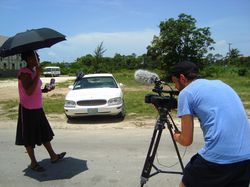 Marjorie is a descendent of Haitian immigrants living in Bahamas. All her life is faced with who she is, who has to be and what she feels by herself.
Marjorie is a descendent of Haitian immigrants living in Bahamas. All her life is faced with who she is, who has to be and what she feels by herself.
Andrew Turley recent MA graduate of Granada Centre for Visual Anthropology, University of Manchester.
Director: Andrew Turley
Production: Granada Centre for Visual Anthropology
Language of dialogues:English and Haithian Creole
Language of subtitles: English, Czech
Italy, 2011, 52 min
Claudia Palazzi & Clio Sozzani
26.01.2013 14:00
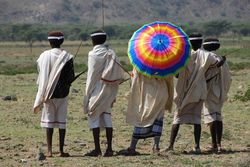 Sometimes apparently normal people hide extraordinary and important stories. Roba comes from a remote pastoralist Ethiopian village. Belonging to the Karrayu clan, he grew up among the herders and his path of life was a matter of tradition. However, his passion for school will conduct him through a series of amazing events: the escape to the Capital city, the family conflict, the internal doubts and the hope for reconciliation, a terrible drought in the Karrayu lands, the loneliness of the city life, an unexpected journey to Italy, the death of his brother killed in an ethnic conflict, and finally the coronation of a big dream.
Sometimes apparently normal people hide extraordinary and important stories. Roba comes from a remote pastoralist Ethiopian village. Belonging to the Karrayu clan, he grew up among the herders and his path of life was a matter of tradition. However, his passion for school will conduct him through a series of amazing events: the escape to the Capital city, the family conflict, the internal doubts and the hope for reconciliation, a terrible drought in the Karrayu lands, the loneliness of the city life, an unexpected journey to Italy, the death of his brother killed in an ethnic conflict, and finally the coronation of a big dream.
Jeans and Martó reveals the complexity of the „Ethiopia of the new milenium“, constricted between modernity and tradition, pastoralist and urban lifestyle, old and new generations who struggle to adapt to such a rapid transformation. Roba´s unique and privileged point of view provides a new way of considering a very burning issue of present time, namely how tradition and modernity could possibly work together in building a better future.
Claudia Palazzi - sociologist and film maker. In 2005 she directed two documentaries ("In Benito´s land. Predappio" and "Memories of Crespi d´Adda"), selected in internationl festivals. Since 2006, she follows the scriptwriting of various projects for different Italian production companies. She also collaborates in cinema production such as Lucky red and janus international. In 2008 she started writing and working as Director Assistant in several documentary series focused on modern society and culure, broadcasted in main National Channels.
Clio Sozzani - Anthropologist and film maker. Since 2005 she is working as film director and scripwriter for different international production companies and no profit organization, mainly in Italy, Senegal and Ethiopia. Together with Claudia Palazzi, she wrote the script of a 52 minute film on women´s entrepreneurship, winner of the funding of the Italian Film Commission and directed two 26 minutes social documentaries that participated at Leipzig, milan, Rome, Venice Film Festivals. She is now developing web documentary for Slow Food.
Director: Claudia Palazzi & Clio Sozzani
Language of dialogues:Amharis/ Omoro
Language of subtitles: English, Czech
Launching of film, awards:
Awarded best documentary at CINESTRAT 2011 in Spain
Winner of the "Babel" and "Trenord" Prizes and of a Special Mention at the XXII African, Asian and Latin American Film festival in Milan (2012)
CZ, 2011, 29 min
Petr Kotrla
25.01.2013 21:00
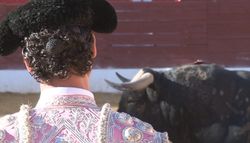 Matadors vs guardians of the animal rights, tradition vs animal rights. The movie is dealing with both sides of point of view on this conflikt, which relates to corrida-famous spanish phenomenon.
Matadors vs guardians of the animal rights, tradition vs animal rights. The movie is dealing with both sides of point of view on this conflikt, which relates to corrida-famous spanish phenomenon.
Petr Kotrla graduated in medial studies and journalism at Masaryk University, Czech Republic. This movie was part of his thesis. Since 2007 he has work in Czech Television as editor, director a script writer.
Director: Petr Kotrla
Production: Petr Kotrla
Language of dialogues: Spain
Language of subtitles: Czech
Romania, 2012, 33 min
Mihai Andrei Leaha
26.01.2013 18:35
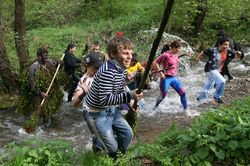 The film is an attempt to question the ways in which the visual narrative is constructed when using the feedback method. The feedback provided by the people involved (the young performers but also the elders) in the Babaluda Feast, turned out to be very important in offering an insight to the ways in which the Feast was depicted by the visual ethnographer. By recoding the shared visual ethnography, that was arranged in big groups in a large screening rooms, but also in small groups in private houses, the film will try to experiment the ways in which the visual narrative is constructed by looking at, the looked at. The montage method of the film will use a chronotopic montage technique (Bakhtin), in which the time and space unity will be enacted in a visual ethnographic present.
The film is an attempt to question the ways in which the visual narrative is constructed when using the feedback method. The feedback provided by the people involved (the young performers but also the elders) in the Babaluda Feast, turned out to be very important in offering an insight to the ways in which the Feast was depicted by the visual ethnographer. By recoding the shared visual ethnography, that was arranged in big groups in a large screening rooms, but also in small groups in private houses, the film will try to experiment the ways in which the visual narrative is constructed by looking at, the looked at. The montage method of the film will use a chronotopic montage technique (Bakhtin), in which the time and space unity will be enacted in a visual ethnographic present.
Mihai Andrei Leaha is PhD Student in Philology. European Studies Faculty, “Babeş-Bolyai” University, Cluj-Napoca, Cluj, România. Thesis: Visual Ethnography. Restructuring Anthropological Knowledge. Video Researching Romanian Traditional Customs.
Director: Mihai Andrei Leaha
Producton: Triba Film
Language of dialogues: Romanian
Language of subtitles: English, Czech
Launching of film, awards:
The film won the Student award in Goettingen International Ethnographic Film Festival.
It also entered the official selection of Film festivals in Sofia (IFEF 2012), Athens (Ethno Fest 2012) and Ho Chi Minh City ( AnthroFilmFestival 2012)
ČR, 2012, 43 min
Kateřina Bubeníčková & Lenka Vochocová
26.01.2013 15:30
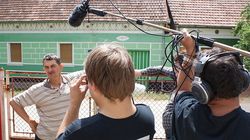 The documentary follows the invasion of inquisitive filmmakers-cum-agroturists in Gerník, a Czech village in the Romanian province of Banát. Members of the team of the Prague-based NGO Inventura, co-authors of the documentary Earthlings, who will you vote for?, travelled to Banát to create a portrait both of a village dying out and of an anthropologist who fights with romantic fantasies about Czech villages in this locality. Is the village, which is being abandoned by whole families who leave for allegedly better life in the Czech Republic, a paradise on Earth, a fully preserved countryside of the 19th century? What do those who stayed think and what were their reasons? How do new media and wind farms fit into the idealized image of the traditional agrarian region?
The documentary follows the invasion of inquisitive filmmakers-cum-agroturists in Gerník, a Czech village in the Romanian province of Banát. Members of the team of the Prague-based NGO Inventura, co-authors of the documentary Earthlings, who will you vote for?, travelled to Banát to create a portrait both of a village dying out and of an anthropologist who fights with romantic fantasies about Czech villages in this locality. Is the village, which is being abandoned by whole families who leave for allegedly better life in the Czech Republic, a paradise on Earth, a fully preserved countryside of the 19th century? What do those who stayed think and what were their reasons? How do new media and wind farms fit into the idealized image of the traditional agrarian region?
Kateřina Bubeníčková and Lenka Vochocová work for NGO called „Inventura“. The main aim of this NGO is try to change public ideas about life of people with mental disability and try to integrate these people to the public via visible of their art work.
Director: Kateřina Bubeníčková & Lenka Vochocová
Production: o.s. Inventura
Language of dialogues:Czech
Language of subtitles:Czech
ČR, 2013, 150 min
Katedra antropologie ZČU v Plzni
26.01.2013 11:00
Together with experts we will discuss the question of filmmaking in anthropology: What is ethnographic film? How can its ethnographicness be characterized? Is there any difference between ethnographic film and a video documentary from field research? What are the advantages and limits of ethnographic film in comparison with text as a standard medium of academic production?
International guests
Johannes Sjoberg, Granada center, University of Manchester, UK
Jaroslava Panáková, Comenius University, Bratislava, Slovakia
Sophie Wagner, festival Ethnocineca, University of Vienna, Austria
The language of communication is English.
Cameroon, Germany, 2012, 62 min
Samuel Loe
25.01.2013 18:20
 Samuel was born and raised in Cameroon. He grew up in a society where everyone believed in the existence of witchcraft. Every tragedy and evil was caused by a supernatural being. His childhood was marked by belief in witchcraft and its practices. After five years of studying film production abroad, he returned to his country, this time not to visit his family but to unveil the mysteries and secrets of witchcraft and his childhood nightmares.
Samuel was born and raised in Cameroon. He grew up in a society where everyone believed in the existence of witchcraft. Every tragedy and evil was caused by a supernatural being. His childhood was marked by belief in witchcraft and its practices. After five years of studying film production abroad, he returned to his country, this time not to visit his family but to unveil the mysteries and secrets of witchcraft and his childhood nightmares.
Samuel Loe was born in Bafoussam in Cameroon. He studies Media production Master in the University Hochschule Ostwestfalen-Lippe in Lemgo (Germany).
Director: Samuel Loe
Language of dialogues: French
Language of subtitles: English, Czech
Launching of film:
The 12th Gottingen International ethnographic Film Festival (Germany)
International festival of Ethnological Film in Belgrade (Serbia)
EthnoFilm fest (Munch - Germany)
Festival of Visual Anthropology in Poland
France, 2012, 28 min
Maria José Pavlovic
26.01.2013 19:30
 S.A.P.E is a acronyme for the Society of Ambience Makers and Elegant People. The followers of this movement are called "sapeurs"; men devoted to elegant dressing originally from the Congo-Brazzaville, West Africa. Part of a sapeur´s achievement is to settle in Paris, the fashion´s capital so there they can become an experimented, recognised sapeur. In Paris they are called "yayas" a lingala expression to name the elderly, those who deserve respect and recognition within the community; those who have made the journey of the S.A.P.E. Through the story of Fuluzioni Di Aluzioni, Annick Bertin "General Firenze" and Chardel Matsanga, this film tries to reveal the main aspects of this congolese practise.
S.A.P.E is a acronyme for the Society of Ambience Makers and Elegant People. The followers of this movement are called "sapeurs"; men devoted to elegant dressing originally from the Congo-Brazzaville, West Africa. Part of a sapeur´s achievement is to settle in Paris, the fashion´s capital so there they can become an experimented, recognised sapeur. In Paris they are called "yayas" a lingala expression to name the elderly, those who deserve respect and recognition within the community; those who have made the journey of the S.A.P.E. Through the story of Fuluzioni Di Aluzioni, Annick Bertin "General Firenze" and Chardel Matsanga, this film tries to reveal the main aspects of this congolese practise.
Independent filmmaker and researcher, Maria José Pavlovic was born and raised in Santiago, Chile. She recently finished her studies in Visual Anthropology at the Granada Centre (University of Manchester, 2012). Since 2006, Maria José has worked and collaborated in different documentary films produced in Chile. Based in Paris, "The Yayas de L´Elégance (2012) is her first film. She is currently developing projects in the Congo - Brazaville, Paris and Ireland.
Director: María Chosé Pavlovic
Production:María Chosé Pavlovic, Frédéric Thooris and The Granada Centre for Visual Anthropology (University of Manchester)
Language of dialogues:French
Language of subtitles: English, Czech
CZ, 2012, 9 min
Pavel Borecký
26.01.2013 16:35
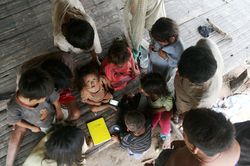 When inhabitants of rainforest walk under its canopy, they see resources for life. The ways of collecting, processing and utilization of these resources are based upon traditional indigenous knowledge which is for „western“ science examined by ethnobotany. The discipline generally focuses on cultural, social and economical relationships between plants and indigenous peoples. Movie camera is during field research used very rarely.Among the other goals of scientific expedition Wayvana Peru 2011 we have strived to answer the question: „Are methods of visual anthropology for preservation of traditional indigenous knowledge applicable? If so, what are pros and cons of this approach?“ The movie is part of „visual ethnobotany“ series and depicts „the story of resource“ piassaba palm (Aphandra natalia).
When inhabitants of rainforest walk under its canopy, they see resources for life. The ways of collecting, processing and utilization of these resources are based upon traditional indigenous knowledge which is for „western“ science examined by ethnobotany. The discipline generally focuses on cultural, social and economical relationships between plants and indigenous peoples. Movie camera is during field research used very rarely.Among the other goals of scientific expedition Wayvana Peru 2011 we have strived to answer the question: „Are methods of visual anthropology for preservation of traditional indigenous knowledge applicable? If so, what are pros and cons of this approach?“ The movie is part of „visual ethnobotany“ series and depicts „the story of resource“ piassaba palm (Aphandra natalia).
Pavel Borecký study PhD. program at University of West Bohemia in Pilsen. He directed ethnographis movie called „Gáj“ and he lead ethnobotanic expedition „Wayvana“ to Peru.
Director: Pavel Borecký
Production: Anthropictures, Institut tropů a subtropů ČZU v Praze
Language of dialogues: Spain
Language of subtitles: Czech
UK, 2010, 57 min
Johannes Sjoberg
27.01.2013 11:45
The film focuses on identity and discrimination in everyday lives of transgendered Brazilians living in Sao Paulo. Fabia Mirassos projects her life through the role of Meg, a transsexual hairdresser confronting intolerance and re-living memories of abuse. Savana 'Bibi' Meirelles plays Zilda who makes her living as one of the many transgendered sex workers in Sao Paulo, as she struggles to find her way out of prostitution.
ČR, 2012, 4 min
Anna Becková & Lucie Benčíková & Martin Jakub
26.01.2013 15:05
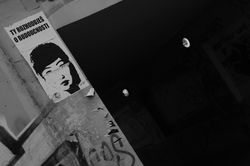 Film "Úsvitu " tries to infiltrate into the life of one group which protests " against current political situation, consumerism and uniformity". By distribution of posters the group tries to enter to public media sphere of streets and point out what people in this group feel like oppresion or attack on freedom of a man. This battle against capitalism is headed by three guys of „Úsvitu“. Dissatisfaction, opinions and emotions felt from society are main things which connect these guys. Using "film language", the authors try to convey the viewer not only their collective beliefs and feelings, but also specific and personal vision of the world.
Film "Úsvitu " tries to infiltrate into the life of one group which protests " against current political situation, consumerism and uniformity". By distribution of posters the group tries to enter to public media sphere of streets and point out what people in this group feel like oppresion or attack on freedom of a man. This battle against capitalism is headed by three guys of „Úsvitu“. Dissatisfaction, opinions and emotions felt from society are main things which connect these guys. Using "film language", the authors try to convey the viewer not only their collective beliefs and feelings, but also specific and personal vision of the world.
Director: Anna Becková & Lucie Benčíková & Martin Jakub
Production: Department of Anthropology of University of Bohemia
Language of dialogues: Czech
Language of subtitles: -
Spain, 2012, 56 min
Javier Arcos & Javier Jarillo
25.01.2013 21:40
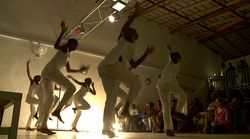 In Velingara, southern Senegal a group of teeneagers struggle to do theater. To go on stage and be part of the trip that will take them through the region of Casamance, they must fight against their fears and their own families, choosing between tradition and modernity.
In Velingara, southern Senegal a group of teeneagers struggle to do theater. To go on stage and be part of the trip that will take them through the region of Casamance, they must fight against their fears and their own families, choosing between tradition and modernity.
Javier Arcos, doctor and filmmaker, is actually combining his work as a filmmaker and as a doctor in health humanitarian emergencies. In 2007 he created the company Synechia Film with Javier Jarillo, filmmaker and producer, specialized in Social Cinema. "Shame in the time of Cholera" is their first feature film. During 2011 they have been working in four documentaries of the International Library of Huanitarian Medicine (in collaboration with World Health Association and the Spanish Agency of Cooperation).
Director: Javier Arios & Javier Jarillo
Production: Sinechia Films
Language of dialogues: French, wolof & poulard
Language of subtitles: English, Czech
Launching of Film:
Festival Internacional de Cine y Video Alternativo y Comunitario "Ojo al Sancocho" (Columbia)
Festival Di Cinema Africand Di verona (Italy)
Montana Cine International Film fetsival (United States)
ČR / PL, 2011, 8 min
Milan Durňák
26.01.2013 17:05
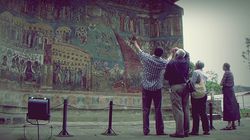 Voroneț is one of the best known and the most visited monastery`s in Romania, especially because of church Saint George. On the wall, it has preserved a lot of frescos (murals) from the 15th century with intensive and not so faded colors. Cultural importance of this place has been appreciated by UNESCO as well, when it has added it to its heritage list. The surrealistic image is created by 6 days observations of the place of monastery and surrounded market place, which are crossed real and symbolic ways of people. Intensive perception of the most fascinating mural of Last Judgement creates mosaic confrontation with the mirror of ideas, visions, watched and listened. Voroneț symbolically conceptualizes the way of life, we believe in.
Voroneț is one of the best known and the most visited monastery`s in Romania, especially because of church Saint George. On the wall, it has preserved a lot of frescos (murals) from the 15th century with intensive and not so faded colors. Cultural importance of this place has been appreciated by UNESCO as well, when it has added it to its heritage list. The surrealistic image is created by 6 days observations of the place of monastery and surrounded market place, which are crossed real and symbolic ways of people. Intensive perception of the most fascinating mural of Last Judgement creates mosaic confrontation with the mirror of ideas, visions, watched and listened. Voroneț symbolically conceptualizes the way of life, we believe in.
Milan Durňak is a PhD student of Institute of ethnology (Faculty of Arts, Charles University in Prague). He concentrates on the problematic of visual ethnography, especially on the possibilities and limits of anthropological film. He has debuted with Christos Voskres /2007/. ANTROPOFEST 2012 has presented his long-term anthropological trilogy Tumenge /2012/, which was released at ETNOFILM ČADCA 2012, festival of documentary films with ethnological and cultural anthropological themes.
Direction: Milan Durňák
Production: Uniwersytet Szczecinski, Polsko / Erasmus Intensive Programme 2011: "Polish settlements in Europe. Anthropological Visualisations of Cultural Phenomena" / Coordinator Dr. Natalia Maksymowicz, Uniwersytet Szczecinski/
Language of dialogues: -
Language of subtitles: -
PREMIERE!!!
UK, 2013, 45 min
Johannes Sjoberg
27.01.2013 11:00
Johannes Sjoberg will present ethnofiction which is used as a complementary approach to anthropological research and representation. Ethnographer´s informants improvise their cultural knowledge in front of camera, revealing aspects of culture that would be hard to uncover and represent with traditional anthropological research methods.
The language of communication is English.
 What´sa nice Girl Like YOu doing in place like this? At a time when strippers are alternately viewed as victims of a patriarchal society or as ampowered feminist icons, this film follows two exotic dancers as they reflect upon their experiences of the industry, and contemplate how their job has affected their identities, touchign upon issues of gender, they body, and self hood.
What´sa nice Girl Like YOu doing in place like this? At a time when strippers are alternately viewed as victims of a patriarchal society or as ampowered feminist icons, this film follows two exotic dancers as they reflect upon their experiences of the industry, and contemplate how their job has affected their identities, touchign upon issues of gender, they body, and self hood.
 This film focuses how people share a collective sense of history through the auditory experience. dehong Tai people embrace Theravada Budhism. In ordes to live better in this world and the next, they perform dignified rituals and acquire "merit". For the rituals they spend years and save money, then they do a good deed like contribution of Budhist statues and building the bridges. chief donators commission an intellectual to write historical scriptures to hand down the good deed to posterity. It is called "Lik Yaat" in Tai and written with beautiful words and rhyme. After the cultural revolution, only a few intellectuals can create and chant "Lik Yaat" now. There is a woman, Wan Xiand-ya, who strives for the tradition of "Lik Yaat". She should be their first and last female intellectual who can write "Lik Yaat" in Tai history.
This film focuses how people share a collective sense of history through the auditory experience. dehong Tai people embrace Theravada Budhism. In ordes to live better in this world and the next, they perform dignified rituals and acquire "merit". For the rituals they spend years and save money, then they do a good deed like contribution of Budhist statues and building the bridges. chief donators commission an intellectual to write historical scriptures to hand down the good deed to posterity. It is called "Lik Yaat" in Tai and written with beautiful words and rhyme. After the cultural revolution, only a few intellectuals can create and chant "Lik Yaat" now. There is a woman, Wan Xiand-ya, who strives for the tradition of "Lik Yaat". She should be their first and last female intellectual who can write "Lik Yaat" in Tai history. Social document from slum in peruan main city Lima. Every day the people fight for their lifes here , they want to survive and improve their living conditions. Their statements proves, that these people have same dreams and aims like anybody of us.
Social document from slum in peruan main city Lima. Every day the people fight for their lifes here , they want to survive and improve their living conditions. Their statements proves, that these people have same dreams and aims like anybody of us. In some of the diverse cultures of the pacific, especially in Melanesia, the pig is the most important domesticated animal. It is predominantly used for ceremonial purposes such as in funerals, weddings and age-set rituals. Several of the films in the long-term Reef islands Ethnographic Film project thus show the killing of pigs in conjunction with such events, at times giving a some what disturbing impression of human-animal relationships, particularly for audiences uses to see meat only wrapped in cellophane at the local supermarket. In this short film a mummy, daddy, and their little son go out to feed their pigs, conveying the impression of an altogether different human-animal relationship, one of tenderness, care, and love, whilst also showing how children learn through awareness of animals nature and technology.
In some of the diverse cultures of the pacific, especially in Melanesia, the pig is the most important domesticated animal. It is predominantly used for ceremonial purposes such as in funerals, weddings and age-set rituals. Several of the films in the long-term Reef islands Ethnographic Film project thus show the killing of pigs in conjunction with such events, at times giving a some what disturbing impression of human-animal relationships, particularly for audiences uses to see meat only wrapped in cellophane at the local supermarket. In this short film a mummy, daddy, and their little son go out to feed their pigs, conveying the impression of an altogether different human-animal relationship, one of tenderness, care, and love, whilst also showing how children learn through awareness of animals nature and technology. Director Matthew Lancit quit his day job to travel across Cameroon, visiting some of the world’s most joyous funeral celebrations. Throughout his excursion in the foreign countryside, Lancid is taken with the locals’belief that the dead are still roaming the Earth, leading Lancit himself to experience what might be spiritual connection with his own ancestors. Ultimately, Lancit learns about an altogetgher new way to celebrate the dead, their memory, and the way in which they still affect and even interact in our lives.
Director Matthew Lancit quit his day job to travel across Cameroon, visiting some of the world’s most joyous funeral celebrations. Throughout his excursion in the foreign countryside, Lancid is taken with the locals’belief that the dead are still roaming the Earth, leading Lancit himself to experience what might be spiritual connection with his own ancestors. Ultimately, Lancit learns about an altogetgher new way to celebrate the dead, their memory, and the way in which they still affect and even interact in our lives. In the Basque country, the local distribution of agricultural products plays a very important role. Despite the strong pressure of foreign import, the traditional markets are an inseparable part of every day life of local people. Thus number of family farms has continued with its first-class production until these days. However, work at a farm is usually connected with a man – a man herdsman, a man farmer, a man trader. Eventhough, a woman is an important part of this world, she is usually overshadowed. But how is the everyday reality of a woman – landowner? To make a woman visible in the context of agricultural production was one of the goals of the documentary „Gaur 8 Azokan“, which resulted from the need of local rural women to emancipate, and whose hard work we do not know at all. The complementary character of gender roles within the rural world is shown in the light of anthropological perspective, and at the end, it will be clear that the rural world could never exist without both components – the productive and reproductive, the male and female.
In the Basque country, the local distribution of agricultural products plays a very important role. Despite the strong pressure of foreign import, the traditional markets are an inseparable part of every day life of local people. Thus number of family farms has continued with its first-class production until these days. However, work at a farm is usually connected with a man – a man herdsman, a man farmer, a man trader. Eventhough, a woman is an important part of this world, she is usually overshadowed. But how is the everyday reality of a woman – landowner? To make a woman visible in the context of agricultural production was one of the goals of the documentary „Gaur 8 Azokan“, which resulted from the need of local rural women to emancipate, and whose hard work we do not know at all. The complementary character of gender roles within the rural world is shown in the light of anthropological perspective, and at the end, it will be clear that the rural world could never exist without both components – the productive and reproductive, the male and female. Marjorie is a descendent of Haitian immigrants living in Bahamas. All her life is faced with who she is, who has to be and what she feels by herself.
Marjorie is a descendent of Haitian immigrants living in Bahamas. All her life is faced with who she is, who has to be and what she feels by herself. Sometimes apparently normal people hide extraordinary and important stories. Roba comes from a remote pastoralist Ethiopian village. Belonging to the Karrayu clan, he grew up among the herders and his path of life was a matter of tradition. However, his passion for school will conduct him through a series of amazing events: the escape to the Capital city, the family conflict, the internal doubts and the hope for reconciliation, a terrible drought in the Karrayu lands, the loneliness of the city life, an unexpected journey to Italy, the death of his brother killed in an ethnic conflict, and finally the coronation of a big dream.
Sometimes apparently normal people hide extraordinary and important stories. Roba comes from a remote pastoralist Ethiopian village. Belonging to the Karrayu clan, he grew up among the herders and his path of life was a matter of tradition. However, his passion for school will conduct him through a series of amazing events: the escape to the Capital city, the family conflict, the internal doubts and the hope for reconciliation, a terrible drought in the Karrayu lands, the loneliness of the city life, an unexpected journey to Italy, the death of his brother killed in an ethnic conflict, and finally the coronation of a big dream. Matadors vs guardians of the animal rights, tradition vs animal rights. The movie is dealing with both sides of point of view on this conflikt, which relates to corrida-famous spanish phenomenon.
Matadors vs guardians of the animal rights, tradition vs animal rights. The movie is dealing with both sides of point of view on this conflikt, which relates to corrida-famous spanish phenomenon. The film is an attempt to question the ways in which the visual narrative is constructed when using the feedback method. The feedback provided by the people involved (the young performers but also the elders) in the Babaluda Feast, turned out to be very important in offering an insight to the ways in which the Feast was depicted by the visual ethnographer. By recoding the shared visual ethnography, that was arranged in big groups in a large screening rooms, but also in small groups in private houses, the film will try to experiment the ways in which the visual narrative is constructed by looking at, the looked at. The montage method of the film will use a chronotopic montage technique (Bakhtin), in which the time and space unity will be enacted in a visual ethnographic present.
The film is an attempt to question the ways in which the visual narrative is constructed when using the feedback method. The feedback provided by the people involved (the young performers but also the elders) in the Babaluda Feast, turned out to be very important in offering an insight to the ways in which the Feast was depicted by the visual ethnographer. By recoding the shared visual ethnography, that was arranged in big groups in a large screening rooms, but also in small groups in private houses, the film will try to experiment the ways in which the visual narrative is constructed by looking at, the looked at. The montage method of the film will use a chronotopic montage technique (Bakhtin), in which the time and space unity will be enacted in a visual ethnographic present. The documentary follows the invasion of inquisitive filmmakers-cum-agroturists in Gerník, a Czech village in the Romanian province of Banát. Members of the team of the Prague-based NGO Inventura, co-authors of the documentary Earthlings, who will you vote for?, travelled to Banát to create a portrait both of a village dying out and of an anthropologist who fights with romantic fantasies about Czech villages in this locality. Is the village, which is being abandoned by whole families who leave for allegedly better life in the Czech Republic, a paradise on Earth, a fully preserved countryside of the 19th century? What do those who stayed think and what were their reasons? How do new media and wind farms fit into the idealized image of the traditional agrarian region?
The documentary follows the invasion of inquisitive filmmakers-cum-agroturists in Gerník, a Czech village in the Romanian province of Banát. Members of the team of the Prague-based NGO Inventura, co-authors of the documentary Earthlings, who will you vote for?, travelled to Banát to create a portrait both of a village dying out and of an anthropologist who fights with romantic fantasies about Czech villages in this locality. Is the village, which is being abandoned by whole families who leave for allegedly better life in the Czech Republic, a paradise on Earth, a fully preserved countryside of the 19th century? What do those who stayed think and what were their reasons? How do new media and wind farms fit into the idealized image of the traditional agrarian region? Samuel was born and raised in Cameroon. He grew up in a society where everyone believed in the existence of witchcraft. Every tragedy and evil was caused by a supernatural being. His childhood was marked by belief in witchcraft and its practices. After five years of studying film production abroad, he returned to his country, this time not to visit his family but to unveil the mysteries and secrets of witchcraft and his childhood nightmares.
Samuel was born and raised in Cameroon. He grew up in a society where everyone believed in the existence of witchcraft. Every tragedy and evil was caused by a supernatural being. His childhood was marked by belief in witchcraft and its practices. After five years of studying film production abroad, he returned to his country, this time not to visit his family but to unveil the mysteries and secrets of witchcraft and his childhood nightmares.  S.A.P.E is a acronyme for the Society of Ambience Makers and Elegant People. The followers of this movement are called "sapeurs"; men devoted to elegant dressing originally from the Congo-Brazzaville, West Africa. Part of a sapeur´s achievement is to settle in Paris, the fashion´s capital so there they can become an experimented, recognised sapeur. In Paris they are called "yayas" a lingala expression to name the elderly, those who deserve respect and recognition within the community; those who have made the journey of the S.A.P.E. Through the story of Fuluzioni Di Aluzioni, Annick Bertin "General Firenze" and Chardel Matsanga, this film tries to reveal the main aspects of this congolese practise.
S.A.P.E is a acronyme for the Society of Ambience Makers and Elegant People. The followers of this movement are called "sapeurs"; men devoted to elegant dressing originally from the Congo-Brazzaville, West Africa. Part of a sapeur´s achievement is to settle in Paris, the fashion´s capital so there they can become an experimented, recognised sapeur. In Paris they are called "yayas" a lingala expression to name the elderly, those who deserve respect and recognition within the community; those who have made the journey of the S.A.P.E. Through the story of Fuluzioni Di Aluzioni, Annick Bertin "General Firenze" and Chardel Matsanga, this film tries to reveal the main aspects of this congolese practise. When inhabitants of rainforest walk under its canopy, they see resources for life. The ways of collecting, processing and utilization of these resources are based upon traditional indigenous knowledge which is for „western“ science examined by ethnobotany. The discipline generally focuses on cultural, social and economical relationships between plants and indigenous peoples. Movie camera is during field research used very rarely.Among the other goals of scientific expedition Wayvana Peru 2011 we have strived to answer the question: „Are methods of visual anthropology for preservation of traditional indigenous knowledge applicable? If so, what are pros and cons of this approach?“ The movie is part of „visual ethnobotany“ series and depicts „the story of resource“ piassaba palm (Aphandra natalia).
When inhabitants of rainforest walk under its canopy, they see resources for life. The ways of collecting, processing and utilization of these resources are based upon traditional indigenous knowledge which is for „western“ science examined by ethnobotany. The discipline generally focuses on cultural, social and economical relationships between plants and indigenous peoples. Movie camera is during field research used very rarely.Among the other goals of scientific expedition Wayvana Peru 2011 we have strived to answer the question: „Are methods of visual anthropology for preservation of traditional indigenous knowledge applicable? If so, what are pros and cons of this approach?“ The movie is part of „visual ethnobotany“ series and depicts „the story of resource“ piassaba palm (Aphandra natalia). Film "Úsvitu " tries to infiltrate into the life of one group which protests " against current political situation, consumerism and uniformity". By distribution of posters the group tries to enter to public media sphere of streets and point out what people in this group feel like oppresion or attack on freedom of a man. This battle against capitalism is headed by three guys of „Úsvitu“. Dissatisfaction, opinions and emotions felt from society are main things which connect these guys. Using "film language", the authors try to convey the viewer not only their collective beliefs and feelings, but also specific and personal vision of the world.
Film "Úsvitu " tries to infiltrate into the life of one group which protests " against current political situation, consumerism and uniformity". By distribution of posters the group tries to enter to public media sphere of streets and point out what people in this group feel like oppresion or attack on freedom of a man. This battle against capitalism is headed by three guys of „Úsvitu“. Dissatisfaction, opinions and emotions felt from society are main things which connect these guys. Using "film language", the authors try to convey the viewer not only their collective beliefs and feelings, but also specific and personal vision of the world.
 Voroneț is one of the best known and the most visited monastery`s in Romania, especially because of church Saint George. On the wall, it has preserved a lot of frescos (murals) from the 15th century with intensive and not so faded colors. Cultural importance of this place has been appreciated by UNESCO as well, when it has added it to its heritage list. The surrealistic image is created by 6 days observations of the place of monastery and surrounded market place, which are crossed real and symbolic ways of people. Intensive perception of the most fascinating mural of Last Judgement creates mosaic confrontation with the mirror of ideas, visions, watched and listened. Voroneț symbolically conceptualizes the way of life, we believe in.
Voroneț is one of the best known and the most visited monastery`s in Romania, especially because of church Saint George. On the wall, it has preserved a lot of frescos (murals) from the 15th century with intensive and not so faded colors. Cultural importance of this place has been appreciated by UNESCO as well, when it has added it to its heritage list. The surrealistic image is created by 6 days observations of the place of monastery and surrounded market place, which are crossed real and symbolic ways of people. Intensive perception of the most fascinating mural of Last Judgement creates mosaic confrontation with the mirror of ideas, visions, watched and listened. Voroneț symbolically conceptualizes the way of life, we believe in.